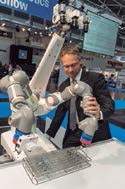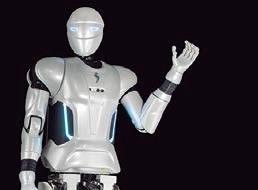With a robot density of 292 units per 10,000 workers, the German economy is among the most automated locations worldwide and ranked number one in Europe according to recent robot statistics (IFR). Based on the model of large companies, German medium-sized firms are now facing a revolutionary wave of automation.
The reason is that a new generation of robots without protective fence is ready to be launched and take their place in manufacturing enterprises. These COBOTS collaborate as assistants hand-in-hand with workers. Human-robot teams aim to combine the strengths of human resources with the technical capabilities of robots. The world’s largest robot trade fair AUTOMATICA will inform SMEs about the latest possibilities of automation in Munich from June 21 to 24. The current generation of collaborating robots (COBOTS) owes their new field of application in the environment of small- and medium- sized firms to the research idea of making them easily controllable by people. Based on the model of a human apprentice, the workers show the COBOTS new tasks, for example, by moving their hands for a required work process and consequently automatically programming the movement. With that, developers are betting on an intuitive application that has proven itself in the use of smartphones, for example. Machine vision systems and sensors enable the new robot colleagues to communicate easily and safely with their surrounding infrastructure—an essential prerequisite for a networked Industry 4.0 strategy. The flexible skills of the COBOTS, which were previously unknown, will play a key role for SMEs. The human-robot teams represent a third option in addition to full automation and pure manual work. The collaborating robots make a new type of intelligent work flow between man and machine possible. For example, a COBOT handles monotonous, dangerous or physically stressful work while people can concentrate on very demanding assembly work as well as creative troubleshooting at the same time. The fast conversion of a human-robot team to a new production process also makes it possible to produce even the smallest quantities more inexpensively. “Human-robot teams are paving a revolutionary new path for SMEs to automate their production at a top-rate technical level and consequently ensure the competitive position of medium-sized companies,” said Dr. Martin Lechner, Head of Technology Trade Fairs at Messe München and responsible for AUTOMATICA.







